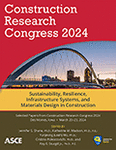Characteristics and Influencing Factors of HVAC Energy Consumption in US Residential Buildings
Publication: Construction Research Congress 2024
ABSTRACT
Residential buildings account for over 20% of total energy consumption in the US, with heating, ventilation, and air conditioning (HVAC) consuming the most energy. However, there is little research that comprehensively explores how different influential factors affect energy consumption of space heating (SPH) and space cooling (SPC) separately. Therefore, based on RECS 2015, this study investigates the influencing factors of HVAC energy usage in single-family detached houses, differentiating SPH and SPC. Random forest regression and multiple linear regression are employed to model energy consumption, and their performance is compared. The results illustrate that nonlinear models fit HVAC energy usage better, with higher goodness of fit and fewer predictors. The determinants identified by both methods are similar, emphasizing housing size and climate over demographics, and vary by SPH and SPC. The order of influencing factors for SPH is climate > fuel type > housing size > number of windows; however, that for SPC is climate > housing size > equipment type > AC vintage. Finally, the study confirms that electrified SPH leads to less energy use. The findings contribute to understanding the differences in HVAC energy consumption and their influencing factors, facilitating the design of energy-efficiency programs.
Get full access to this article
View all available purchase options and get full access to this chapter.
REFERENCES
Debs, L., and Metzinger, J. (2022). A Comparison of Energy Consumption in American Homes by Climate Region. Buildings, 12(1), 82. https://doi.org/10.3390/buildings12010082.
Estiri, H. (2014). Building and household X-factors and energy consumption at the residential sector: A structural equation analysis of the effects of household and building characteristics on the annual energy consumption of US residential buildings. Energy Econ., 43, 178–184. https://doi.org/10.1016/j.eneco.2014.02.013.
Feng, F., Li, Z., Ruan, Y., and Xu, P. (2016). An Empirical Study of Influencing Factors on Residential Building Energy Consumption in Qingdao City, China. Energy Procedia, 104, 245–250. https://doi.org/10.1016/j.egypro.2016.12.042.
Fumo, N., and Rafe Biswas, M. A. (2015). Regression analysis for prediction of residential energy consumption. Renewable and Sustainable Energy Rev., 47, 332–343. https://doi.org/10.1016/j.rser.2015.03.035.
González-Torres, M., Pérez-Lombard, L., Coronel, J. F., Maestre, I. R., and Yan, D. (2022). A review on buildings energy information: Trends, end-uses, fuels and drivers. Energy Rep., 8, 626–637. https://doi.org/10.1016/j.egyr.2021.11.280.
Huo, T., Cai, W., Zhang, W., Wang, J., Zhao, Y., and Zhu, X. (2021). How does income level impact residential-building heating energy consumption? Micro-level evidence from household surveys. Environ. Impact Assess. Rev., 91, 106659. https://doi.org/10.1016/j.eiar.2021.106659.
Karatasou, S., and Santamouris, M. (2019). Socio-economic status and residential energy consumption: A latent variable approach. Energy and Build., 198, 100–105. https://doi.org/10.1016/j.enbuild.2019.06.013.
Kim, Y.-J., Lee, S.-J., Jin, H.-S., Suh, I.-A., and Song, S.-Y. (2020). Comparison of linear and nonlinear statistical models for analyzing determinants of residential energy consumption. Energy and Build., 223, 110226. https://doi.org/10.1016/j.enbuild.2020.110226.
Kuang, B., Schelly, C., Ou, G., Sahraei-Ardakani, M., Tiwari, S., and Chen, J. (2023). Data-driven analysis of influential factors on residential energy end-use in the US. J. Build. Eng., 106947. https://doi.org/10.1016/j.jobe.2023.106947.
Lazic, S. E. (2008). Why we should use simpler models if the data allow this: Relevance for ANOVA designs in experimental biology. BMC Physiol., 8, 16. https://doi.org/10.1186/1472-6793-8-16.
Lee, S.-J., Kim, Y.-J., Jin, H.-S., Kim, S.-I., Ha, S.-Y., and Song, S.-Y. (2019). Residential End-Use Energy Estimation Models in Korean Apartment Units through Multiple Regression Analysis. Energies, 12(12), Article 12. https://doi.org/10.3390/en12122327.
Liu, G., Kong, Z., Dong, J., Dong, X., Jiang, Q., Wang, K., Li, J., Li, C., and Wan, X. (2021). Influencing Factors, Energy Consumption, and Carbon Emission of Central Heating in China: A Supply Chain Perspective. Front. in Energy Res., 9. https://www.frontiersin.org/articles/10.3389/fenrg.2021.648857.
Sanquist, T. F., Orr, H., Shui, B., and Bittner, A. C. (2012). Lifestyle factors in U.S. residential electricity consumption. Energy Policy, 42, 354–364. https://doi.org/10.1016/j.enpol.2011.11.092.
Schober, P., Boer, C., and Schwarte, L. A. (2018). Correlation Coefficients: Appropriate Use and Interpretation. Anesthesia and Analgesia, 126(5), 1763–1768. https://doi.org/10.1213/ANE.0000000000002864.
Schwartz, L., et al. (2017). Electricity End Uses, Energy Efficiency, and Distributed Energy Resources Baseline. https://escholarship.org/uc/item/0n32c92z.
Swan, L. G., and Ugursal, V. I. (2009). Modeling of end-use energy consumption in the residential sector: A review of modeling techniques. Renewable and Sustainable Energy Rev., 13(8), 1819–1835. https://doi.org/10.1016/j.rser.2008.09.033.
US EIA (Environment Information Administration). (2015a). Residential Energy Consumption Survey (RECS) 2015 Consumption and Expenditures Technical Documentation Summary (p. 31).
US EIA (Environment Information Administration). (2022). Monthly Energy Review – November 2022. 282.
US EIA (Environment Information Administration). (2015b). 2015 RECS Survey Data. https://www.eia.gov/consumption/residential/data/2015.
Zhao, H., and Magoulès, F. (2012). A review on the prediction of building energy consumption. Renewable and Sustainable Energy Rev., 16(6), 3586–3592.
Zhu, M., Huang, Y., Wang, S.-N., Zheng, X., and Wei, C. (2023). Characteristics and patterns of residential energy consumption for space cooling in China: Evidence from appliance-level data. Energy, 265, 126395. https://doi.org/10.1016/j.energy.2022.126395.
Information & Authors
Information
Published In
History
Published online: Mar 18, 2024
Authors
Metrics & Citations
Metrics
Citations
Download citation
If you have the appropriate software installed, you can download article citation data to the citation manager of your choice. Simply select your manager software from the list below and click Download.
